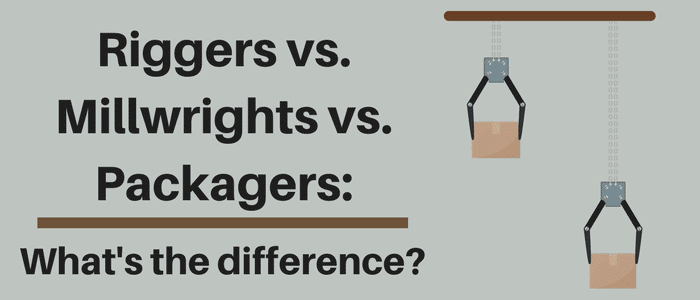Riggers vs. Millwrights vs. Packagers: What’s the Difference?
When a piece of large machinery needs to be de-installed, removed, transported and installed, several professionals must work in concert to make it happen. In general, these professionals fall into three categories: millwrights, riggers and packagers. But what exactly is the difference between these three jobs and how to know when you need a millwright versus a rigger?
Here we break down these different roles to help you understand how to move equipment safely and efficiently.
Riggers
A rigger is someone who works with hoists and pulleys. In a factory, a rigger works on the exterior of a piece of machinery, and is involved in lifting, securing, positioning, pulling and moving the machinery. Riggers might be required to lift fragile machines that weigh a couple of tons, or entire buildings that weigh thousands of tons. Sometimes these machines are worth millions of dollars.
In the past, riggers worked on sail boats. They were responsible for the rigging that hoisted and held the sails. Their skills were also used for lifting other equipment using ropes and pulleys. Before the industrial revolution, heavy loads had to be lifted only through manpower and pulley systems. Riggers were experts at using the concepts of engineering to make loads lighter to lift. Now they use advanced tools including cranes, gantries, hydraulic lifts, chain hoists and winches to lift heavy equipment.
Millwrights
A millwright is someone who installs, deinstalls, maintains, diagnoses and repairs industrial machines. Their work involves precision and the specifics of a machine construction. These machines typically cost millions and a millwright is involved in optimizing the machines for their specific application; diagnosing and fixing problems that arise; as well as breaking down and installing equipment before and after relocation.
As the name suggests, millwrights used to work in mills – before the industrial revolution this meant sawmills, flour mills and paper mills that were powered by water or wind. As iron and steel changed the industrial world, the name millwright stuck even as the job changed drastically.
Millwrights are extensively trained to maintain machinery. Whenever a machine needs to be moved or deinstalled, a millwright will certainly be needed to inform the riggers and packagers how the machinery works so that they have the information they need to move the machinery appropriately. The millwright will also be responsible for breaking the machine down so that it can be moved.
Most millwrights are riggers, but not all riggers are millwrights.
Packagers
A packager is responsible for protecting the equipment in transit, after it has been deinstalled. Some packagers work in the factory where the machinery is, packaging it onsite. Other times, riggers bring the machine to the packager’s workshop, where the machine is landed and crated.
A packager takes the information about how the machine will be transported and makes appropriate packages to protect the machinery or product. This involves protecting against a number of possible elements: bumps and drops, moisture, vibration, impact, and more.
In the past, packaging was a more haphazard job involving crates and boxes of different sizes, with no real standards about how things could be uniformly moved. Now we have uniform global shipping container sizes and can ensure certain precautions and standards are met. At the same time, what we are sending has become ever more technologically-advanced, fragile, expensive, and potentially dangerous. Packagers must be adept at packaging everything from weapons systems to hazardous chemicals to microscopically-intricate technology.
The right expert for the job
Understanding the differences between riggers, millwrights and packagers is the first step to a successful factory relocation or heavy machinery transportation job. Contact Reid Packaging by calling 800.642.1823 when you’re preparing to move machinery. We can provide properly specified packaging or coordinate the entire project for you. With over 30 years in the industry we have cultivated relationships with expert riggers and millwrights to ensure that the units are transported safely, efficiency and economically.

